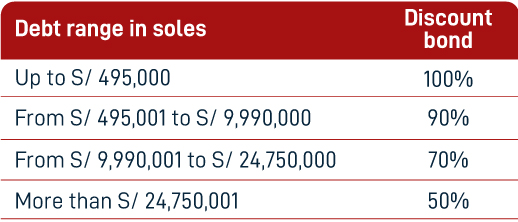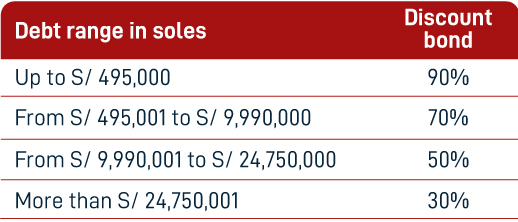NEWSLETTER
REGULATIONS OF INTEREST
Payments on account of Income Tax for indirect alienation of shares.- Legislative Decree No. 1624, published on August 4, 2024, amends Article 84-B of the Income Tax Law (LIR), so that domiciled individuals make payments on account of the second category income they receive for the indirect alienation of shares.
The procedure will consist of the following:
- Income received for each disposal (minus) Computable cost = Gross income
- Gross income (minus) Losses (Article 36 of the LIR) = Net Income
- Payment on account = Net income * 5%.
The amendments will be effective as from January 1, 2025.
The General Sales Tax (IGV) is levied on digital services rendered by non-domiciled persons and on the import of intangible goods through the Internet.- By means of Legislative Decree No. 1623, published on August 4, 2024, the following amendments are made to the IGV Law:
- Taxpayers
- Individuals who do not carry out business activities and who use in the country digital services provided by non-domiciled subjects or acquire intangible goods through the Internet.
- Operations taxed with the IGV
- The use of services provided by non-domiciled individuals, provided that such services qualify as digital and are used by individuals who do not carry out business activities.
- The importation of intangible goods through the Internet in which the acquirer is a natural person who does not carry out a business activity.
- Collection of IGV
- Non-domiciled taxpayers must register in the RUC and act as withholding and/or collection agents of the tax and declare and pay monthly the IGV (in local currency or in U.S. dollars), in addition to filing an annual informative return, in the form and conditions established by SUNAT.
- In the absence of the above, the payment facilitators shall be the ones to withhold and collect the IGV.
- The Legislative Decree came into effect on August 25, 2024.
- Withholding or collection of IGV will begin as from October 1, 2024.
On August 24, 2024, Supreme Decree No. 157-2024-EF was published, which approved the regulations applicable to Legislative Decree No. 1623. It establishes:
- Which are the entities of the Peruvian financial system that will act as payment facilitating subjects.
- The definition of “Underlying Transaction”.
- The procedure for the compensation and refund of the IGV paid unduly and/or in excess, if applicable.
Subsequently, on August 30, 2024, Superintendence Resolution No. 173-2024/SUNAT was published, which regulates the registration in the RUC of non-domiciled suppliers, who will act as withholding or collection agents of the IGV in these new cases.
Special Fractionation for Tax Debts administered by SUNAT (FEDT) is approved – By means of Legislative Decree N° 1634, published on August 30, 2024, the following provisions are approved:
- Debt subject to the FEDT:
- Any tax debt administered by SUNAT that qualifies as income of the Public Treasury due as of December 31, 2023, contained in Determination Resolutions, Payment Orders, Fine Resolutions, collection settlements, customs settlements or other resolutions, including the balances of fractionations and deferrals pending payment.
- Said debt includes interest, updates and capitalized interest, if applicable.
- Not eligible:
- Debts included in bankruptcy proceedings.
- Taxes withheld or collected, as well as ESSALUD contributions.
- Contested debts that have a final and/or consented or res judicata judicial resolution and at the same time have a letter of guarantee.
- Surcharges, referred to in article 2 of the General Customs Law.
- Subjects excluded from the FEDT:
- Individuals with conviction sentence consented or executed for tax or customs offense.
- The National Public Sector.
- Subjects that are or have been included in Law No. 30737, Law for the payment of civil reparations for corruption offenses.
- Application for acceptance:
- It may be submitted until December 20, 2024 indicating the debt subject of the request.
- It must include the total of the debt contained in the resolution of determination or liquidation of collection or liquidation referred to the customs declaration, resolution of fine, payment order or other resolution issued by SUNAT. Partial acceptance is not allowed with respect to the debt contained in one of these acts.
- The filing of the request implies the abandonment of the administrative tax proceeding (before SUNAT or the Tax Court) or the contentious administrative tax proceeding (before the Judiciary).
- Methods of payment:
- 3 payment methods are provided for: (i) Cash payment; (ii) summary payment (a hosting payment of at least 25% of the amount hosted plus 3 monthly installments); and (iii) installment payment (a hosting payment of at least 10% of the amount hosted, plus monthly installments up to a maximum number of 72).
- Discount voucher
- The taxpayer is granted a “discount voucher” on the interest on the tax (there is no remission of the unpaid tax), the fines, and the interest on the fines.
- The amount of the discount will depend on the payment method chosen by the taxpayer, and on the debt ranges established for each case.
- Cash payment and summary payment:

- Cash payment and summary payment:

- The interest rate of the installment is 60% of the TIM (moratorium interest rate).
- In the next 2 months the Regulation of Legislative Decree N° 1634 will be published, regulating the operational aspects of the FEDT.
The Integrated Text of SUNAT’s Regulation of Organization and Functions is approved. By means of Superintendence Resolution No. 000159-2024/SUNAT, published on August 4, 2024, the Integrated Text of the Regulation of Organization and Functions of the National Superintendence of Customs and Tax Administration – SUNAT is approved, which contains SUNAT’s organization chart, the classification of Internal Tax Intendancies and dependent organizational units, the classification of Customs Intendancies and dependent organizational units, as well as the administrative support organizational units according to hierarchical dependence and administrative jurisdiction at the national level.
This rule is in force as of October 21, 2024.
Discretionary power of not sanctioning infractions related to the use of the Integrated System of Electronic Records (SIRE) – By means of Resolution of the National Deputy Superintendence of Internal Taxes N° 000028-2024-SUNAT/700000, published on August 10, 2024, it has been decided to apply the discretionary power of not sanctioning administratively the infractions typified in numerals 2 and 10 of article 175 of the Tax Code, to those taxpayers who:
1. Have not made the closing of their records in the Electronic Book System, prior to the use of SIRE or, have not used the latter system within the deadlines established for the periods of August, September, October, November and December 2024; and,
2. Regularize their omissions until January 31, 2025.
CASE LAW
The Fifth Constitutional and Social Transitory Chamber of the Supreme Court states that the Tax Court is empowered to rule on nullity defects that occurred during the audit procedure even when such nullity is deducted in the pleadings during the appeal stage.
This criterion is reiterated in Case No. 24202-2023, Lima.
Administrative expenses, financial expenses, exchange differences and other charges are excluded from the calculation of the gross profit margin in construction contracts (Ruling No. 10538-3-2023) – The taxpayer applied the procedure of paragraph a) of article 63° of the LIR in order to determine the gross taxable income related to its construction contracts, including administrative expenses, financial expenses, exchange differences and other charges in the budgeted costs, considering that these qualified as “indirect costs” and article 20° of the LIR should be applied.
The Tax Court confirmed SUNAT’s position in the sense that these disbursements were not admitted as part of the budgeted cost because, according to the provisions of IAS 11, they are not part of the cost of construction contracts.